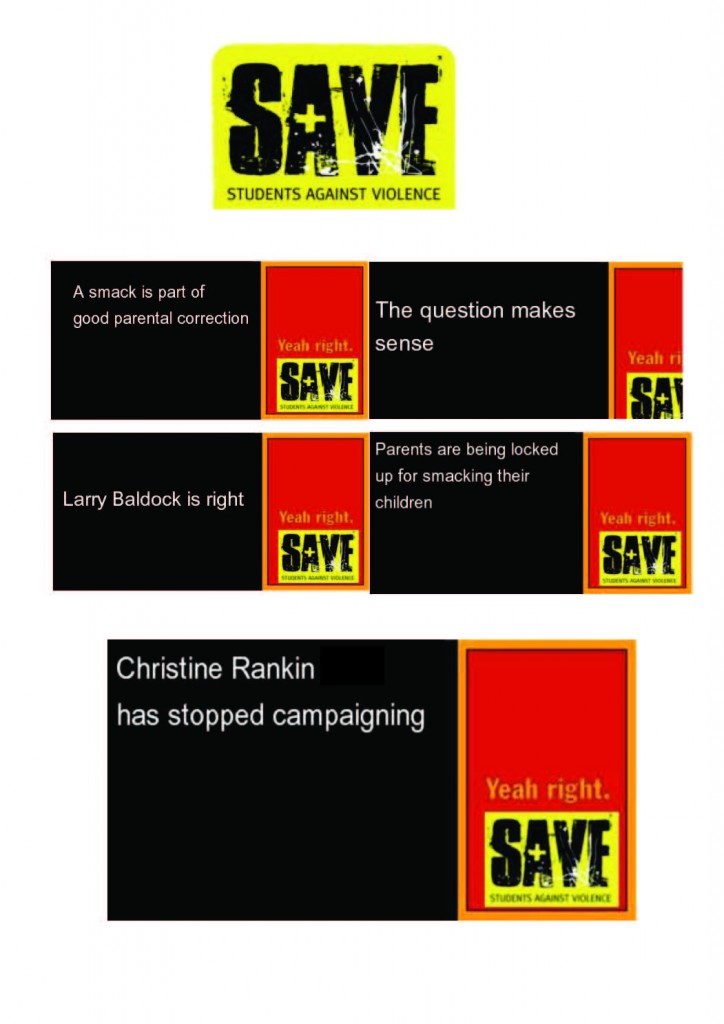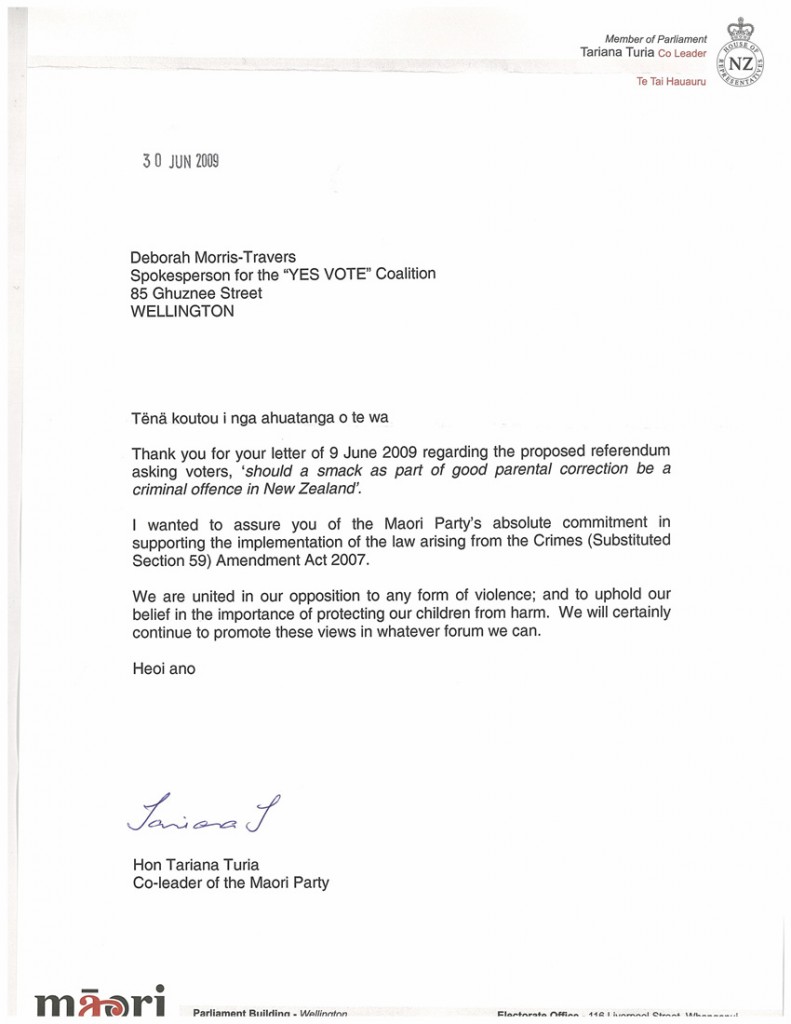Archive for the news Category
July 11, 2009
Three out of four New Zealanders believe the upcoming “anti-smacking” referendum is a waste of money, a survey has found.
The Research New Zealand poll during June of 481 people found 77 percent didn’t support spending money on the non-binding referendum which will cost $8.9m.
Eighteen percent felt it was a good use of taxpayer dollars, while five percent were unsure.
Research New Zealand director Emanuel Kalafatelis said New Zealanders appeared reluctant to spend so much on a referendum during a recession.
“Despite widespread protest about the so-called ‘anti-smacking bill’, it seems Kiwis aren’t willing to spend millions of taxpayers’ dollars on a referendum.”
He said it would be interesting to see how opinions on the cost translated to voter numbers.
Of all the demographic differences in the poll, the only significant difference was between the sexes. Eighty percent of female respondents believed the referendum was a waste of money, compared with 70 percent of male respondents.
July 10, 2009

Youth advocates for YES vote have formed a group called Students Against Violence (SAVE) and yesterday launched a set of novel car stickers. One of its organisers, Johny O’Donnell, 15, said the smacking debate was focusing on the rights of parents to hit their children, and overlooked the rights of children not to be hit.
Based in Nelson, they are keen to get other teens on the campaign trail. Contact details are on their website.
July 9, 2009
A group of students campaigning against violence are asking adults to “speak for them” by voting “yes” in August’s smacking referendum according to a story in the Nelson Mail.
Students Against Violence (Save) founding member Johny O’Donnell, 15, said the smacking debate was focusing on the rights of parents to hit their children, and overlooked the rights of children not to be hit.
A student at Nelson College, he told the Mail he was one of five people who turned up to hear long-time child advocate Beth Wood speak on the referendum at the Victory Community Centre.
He said Save intended to have a stand at the Saturday market on the issue. It wanted to do more but was constrained by a lack of funds.
He helped set up Save in Nelson in March as he believed many young people were affected by violence
July 9, 2009

Maori Party supports rights for children and opposes any violence
July 6, 2009
The Human Rights Commission is to investigate schools’ anti-bullying policies to see whether children’s rights to safety are being protected according to an article published in Wellington’s Dominion Post (June 6, 09). The move follows calls for a national inquiry by parents of bullying victims at Hutt Valley High School. The investigation is linked to a study by the children’s commissioner into pupil safety and school violence.
Chief Human Rights Commissioner Rosslyn Noonan has agreed to analyse the children’s human rights concerns.
Last December nine Hutt Valley High School boys were dragged to the ground and violated by a pack of six classmates. The victims’ parents wrote to the Human Rights Commission alleging a “systematic failure” by state agencies responsible for protecting children. They asked for a national inquiry into violence and human rights abuses in schools.
July 3, 2009
Report on physical punishment in the United States: What research tells us about its effects on children
An extensive report from the Phoenix Children’s Hospital, USA on the effects of physical punishment on children clearly shows connections between physical abuse in later life and physical punishment as a child.
Published last year (2008) the main goal of the report is to provide a concise review of the empirical research to date on the effects physical punishment has on children. It was created for parents and others who care for children, professionals who provide services to them, those who develop policy and programmes that affect children and families, interested members of the public, and children themselves.
The report’s author, Elizabeth T Gershoff, an associate professor of social work at the University of Michigan, received her doctoral degree in Child Development and worked for five years at the National Centre for Children in Poverty at Columbia University.
Her current research focuses on the impacts of parenting and violence exposure on child and youth development over time and within the contexts of families, schools, neighbourhoods and social policies.
The research supports several conclusions:
– There is little research evidence that physical punishment improves children’s behaviour in the long term.
– There is substantial research evidence that physical punishment makes it more, not less, likely that children will be defiant and aggressive in the future.
– There is clear research evidence that physical punishment puts children at risk for negative outcomes, including increased mental health problems.
– There is consistent evidence that children who are physically punished are at greater risk of serious injury and physical abuse.
It also reveals that mounting research evidence shows that physical punishment of children is an ineffective parenting practice comes at a time of decreasing support for physical punishment within the United States and around the world.
The majority of American adults are opposed to physical punishment by school personnel. An increasing number of Americans (now at 29 percent) are opposed to physical punishment by parents. At the same time, there is a growing momentum among other countries to enact legal bans on all forms of physical punishment, bolstered by the fact that the practice has come to be regarded as a violation of international human rights law.
The clear connections between physical abuse and physical punishment that have been made in empirical research and in the child abuse statutes of several states in the US suggest that reduction in parents’ use of physical punishment should be included as integral parts of state and federal child abuse prevention efforts.
July 3, 2009
Listen to John Campbell interview Steve Biddulph on Campbell Live (TV3 July 2, 2009). Biddulph had earlier spoken at St Kentigern School in Auckland, where he told 500 parents to vote yes in the referendum.
July 1, 2009
University of Otago senior lecturer in politics Brian Roper says (Otago Daily Times, 1/7/09) the Government’s $9 million anti-smacking referendum is an “absolutely appalling waste of money”.
He says the $9 million would be better used given to an organisation like Child Youth and Family.
“If [referendum supporters] were committed to ensuring the welfare of children in New Zealand, they’d suggest using the money to protect children from violence in family households, which is an enormous problem compared to parents being prosecuted for light smacking,” Dr Roper said.
He was also critical of the “totally biased” question.His views are suppoprted by fellow academic, associate professor of law, Andrew Geddis who says the referendum had “no legal impact whatsoever”.
June 25, 2009
Media Release: UNICEF NZ (UN Children’s Fund) 24 June, 2009
The UN Children’s Fund in NZ is pleased that the Prime Minister has made an emphatic statement of the Government’s intent to do something about abused children.
“New Zealand’s grim record of child abuse is a national shame and needs urgent attention” says UNICEF NZ executive director, Dennis McKinlay.
“The Prime Minister has recognised this and it is heartening that he has shown leadership with his statement in the House yesterday that not enough has happened and that his government intends to do more.
“We need this commitment to support what communities and individuals are already doing. It is gratifying that he has acknowledged that it’s not enough and that more needs to happen.”
Mr McKinlay referred to the lack of public education following the amendment of S.59 of the Crimes Act in 2007 and believes that if New Zealanders had the opportunity to be well informed about the new legislation, there would be more understanding of and support for the amendment.
“Removing the defence of reasonable force is a step towards eliminating child abuse. Acts of abuse that were previously defended through the old legislation are no longer defensible.”
Mr McKinlay says that he will seek a meeting with the Prime Minister and offer UNICEF’s support in his efforts to deal with our unacceptably high level of child abuse.
“Our youngest citizens are at risk. Support for parents and education about constructive discipline need to be prioritised in the Government agenda to help eliminate child abuse.”
Note: Tuesday 23 June
Hon JOHN KEY: “I go back to the point I just made: members on this side of the House care about abused kids. We look in the hospitals of New Zealand and see thousands of abused kids, and Christine Rankin has spoken out about the damage that is happening to those kids. We are going to do something about abused kids, because not enough happened under the previous Labour Government.”













